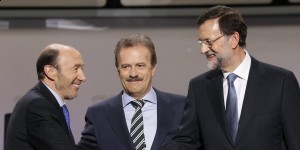
The only head-to-head televised debate of the Spanish general election campaign focused heavily on the crisis-ridden economy, and after a tightly fought contest, Mariano Rajoy remains on course for an overwhelming victory on November 20.
The conservative Popular Party (PP) candidate went into the debate with a 15-point poll lead and seeking to make Spain’s 21-percent jobless rate the hub of the debate. His opponent Alfredo Pérez Rubalcaba has been a key member of the Socialist government, something Rajoy reminded him of on more than one occasion.
“You’re coming up with all these proposals. Why didn’t you do all these things before?” Rajoy asked, highlighting a glaring weakness in Rubalcaba’s position.
The former Socialist interior minister had little choice but to accept the dire state of the Spanish economy from the start. He gave a frank analysis of the crisis, followed by a volley of proposals that were designed to distance himself from Prime Minister José Luis Rodríguez Zapatero.
These included encouraging small businesses with cheaper credit, incentivising hiring of workers by offering to pay Social Security contributions, and an appeal for flexibility from the EU on reducing the public deficit. He also advocated boosting research and development and restoring the property sector in a balanced way.
Rubalcaba also reached out to left-wing voters with a promise to protect the kind of social rights that Zapatero has been eroding over the last year. “We mustn’t let the crisis undermine the basic rights that we have,” he said.
Rubalcaba also sought to turn his biggest weakness –employment– into a weapon, accusing Rajoy of plotting to deregulate the labour market and slash jobless benefits.
Rajoy’s strategy was obvious: to underline the Socialists’ mismanagement of the economy, something he managed reasonably effectively. His problems were more related to his image: his stiff demeanour, an obsession with referring to notes while speaking and his slightly weird, glassy glare when listening. The PP leader also had difficulty in getting Rubalcaba’s name right, instead repeatedly calling him “Sr. Rodríguez Zapatero”, betraying both nerves and the fact that these two politicians had never before engaged in debate.
A clunky format
The debate was hindered by the leaden format that Spanish television tends to favour for this kind of event, rendering the most tantalising of set pieces drawn-out and dry. The physical distance between the candidates did not help, nor did the length of time they were given to deliver their monologues, or the moderator’s timidity.
Both men have substantial reputations as parliamentary debaters but there were few spontaneous moments to grab the viewer’s attention. One came, strangely, when the two men bickered over a detail of the Austrian unemployment system. But they frequently spoke over each other, with the moderator failing to step in.
“You are lying,” charged Rajoy at one point. “Knowing you, that doesn’t surprise me.”
Rubalcaba had Rajoy on the back foot for much of the debate, insisting he specify whether he would, for example, raise VAT, cut unemployment benefits, or roll back gay marriage legislation. The Socialist candidate also looked more relaxed than his rival throughout.
But in behaving like an opposition politician by pressing Rajoy for policy detail, Rubalcaba forfeited the opportunity to look prime ministerial. Some of his probes did leave Rajoy exposed (he didn’t answer his rival’s questions on several issues) but not enough.
Most polls handed Rajoy victory after the campaign’s only debate, reflecting the fact that right now, Spaniards see the troubled economy -and all the problems it is creating- as the only issue.
I think the debate does not merit your article title’s first “s”.
Someone had to say it.
Well I certainly wouldn’t argue with that appraisal….